Shelter’s aim: A perfect match
WEST MILFORD. The West Milford Animal Shelter Society considers its responsibility to be ensuring the best interests of animals and people.
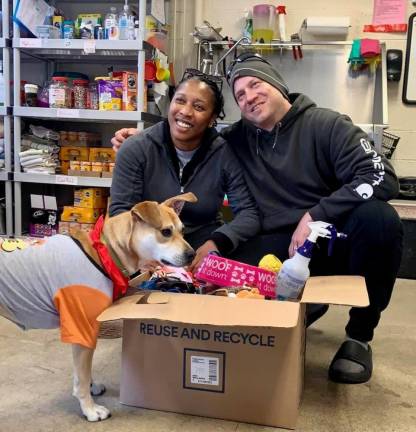
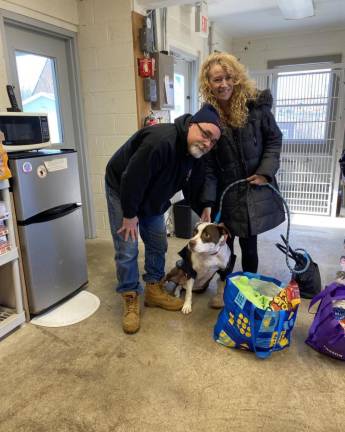
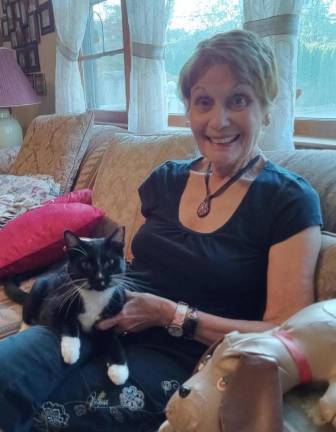
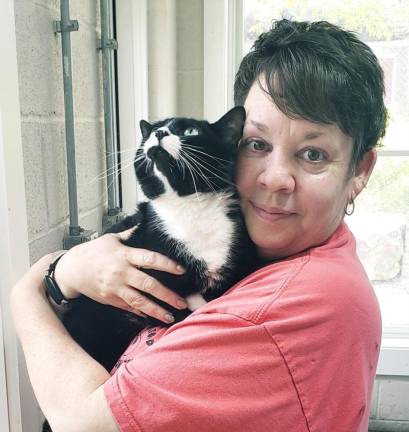
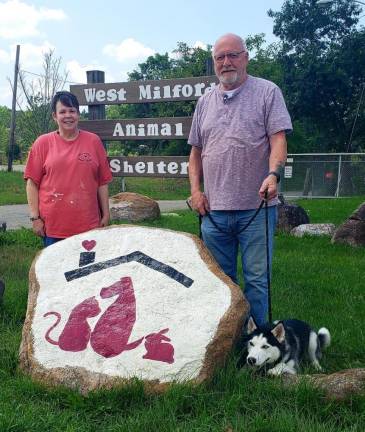
Sonny, a 35-pound mixed-breed Terrier-type pup was not yet 2 years old when he arrived at the West Milford Animal Shelter Society (WMASS) in early 2022.
The extremely active and athletic animal stayed there for more than a year. Earlier, four families found that they couldn’t handle his boundless energy.
Taking Sonny under their wings, WMASS volunteers took on the challenge on preparing him for a new home.
An agile high jumper, the dog loved to play with toys, balls and Frisbees and to compete in tug-of-war.
A regiment of socialization and professional training for both Sonny and the staff gradually helped him become adoptable.
While people-friendly, Sonny was not for just anyone. The shelter team believe that a family could handle him with ongoing training, discipline and patience.
Not a fan of other animals, he needed a single-pet home - preferably with no small children. Sonny would be right for an active family who enjoyed the outdoors.
In March, after 14 months at the shelter, Sonny found his new home with Jamila and Chris Rosal of Newfoundland.
They considered him to be a perfect match.
“Sonny has brought new energy to our home,” Chris said. “After several visits, we knew that this guy would need extra care and attention. We built on the shelter’s work, got advice and took on Sonny’s training ourselves.
“It didn’t take too long for Sonny to become more focused and disciplined and realize that our home and backyard was his, too. He’s now less distracted, except for chasing birds, and we’ve even taken him camping.
“Jamila and I appreciate how much effort the shelter put into Sonny. And their process, which is rigid, helped us prepare for Sonny, who is very different than other dogs we’ve owned. It’s like raising a child, and pet adoption is a long-term commitment.”
Rejected once
For the six months through June 30, WMASS has arranged 50 adoptions: 10 dogs, 37 cats, and three rabbits and Guinea pigs.
In 2022, WMASS had 109 animal adoptions with a 97 percent success rate, a figure that also reflects returns to the shelter.
“As much as we care for the animals, we put as much diligence in the adoption process,” said Paul Laycox, WMASS president. “We want pets and people to succeed. It’s not always a good match. It’s our responsibility to ensure the best interests of our animals and people.
“These animals have been rejected once or more already. We want their new home to be a forever home. So we’re very strict and discerning on how we screen and determine matches.”
Paula Whritenour, WMASS secretary, pointed out that the adoption application and screening process is an educational opportunity for potential adopters.
“Our assessment is mutually beneficial,” she said. “We learn about the would-be adopter and their readiness to bring a pet home. It’s also an eye opener for them.
“Some people realize they’re not yet ready, need more time or (to) better understand what type of animal is best for them. It’s an opportunity for self-assessment and education for all involved parties. We know our animals and it’s important for us to know adopters.”
Potential adopters complete a questionnaire and interview. WMASS explores their current and past experiences, including veterinarian history to ensure that their pets have had proper vaccinations, examinations, and wellness visits.
The shelter staff asks about the home and outdoor environment, other pets, children and other occupants, work away or at home, when the pet may be left alone, and where it will sleep.
“We want to make sure they’ve fully thought through pet adoption,” Whritenour said. “We go through all aspects of pet ownership -feeding, cleaning, walking, grooming, training, any special needs or tendencies, child and baby proofing, vacation care, and ability to handle a sick or injured pet. Pet adoption and ownership shouldn’t be impulsive or spontaneous.”
Long adjustment
The shelter advises that it may take several weeks, if not months, for a new pet to adjust to its family and home. An animal is entering a unfamiliar surrounding after weeks or months at the shelter after abandonment, loss of original owners, sometimes horrible conditions, neglect or abuse. Some pets have special needs.
“We find that a dog or cat takes three days to get used to the shelter, three weeks to get used to new a new home and three months to fully settle in,” Laycox said. “Everything is new again to the pet: people, environment, handling patterns, sounds, smells and possibly other pets. Over time, the pet brought home will be very different, more confident and comfortable.”
In February, Sue and Joe Palazzo of Woodland Park adopted Dozer, a 95-pound pit mix. He has been in the shelter for eight months.
A 5-year-old gentle giant, his size, strength and breed intimidated potential adopters - along with his slowing going blind.
“Joe and I had adopted dogs before, and working with WMASS was the most amazing, positive and thorough process we’ve experienced,” Sue said. “With his eyesight going, some people ask if the shelter pressured us to adopt Dozer. There was never any pressure at all. WMASS was fully up front about Dozer, his vision loss, medical needs, everything.
“Everyone who meets Dozer loves him. He’s part of our family and goes everywhere with us, including the Jersey Shore. WMASS is our extended family. We couldn’t be happier.”
On prowl for cats?
The shelter’s most numerous residents and adopted pets are cats. They also attract the most inquiries from potential owners.
Maryann and Edward Ackerman have adopted several cats and dogs since they arrived in West Milford in the early 1970s.
Last summer, their cat of eight years, Buddy Eyebrows, died, leaving them admittedly heartbroken. The cat had been adopted from WMASS.
“As the months went by, including the holidays and a regular winter trip to Florida, we thought about adopting again,” Maryann said. “It was hard, even feeling guilty moving on from Buddy Eyebrows. I told Ed, it’s ‘in my nature to nurture.’ We went to Petfinder and elsewhere and spoke with people we knew at WMASS. We found that we were ready.”
Not necessarily looking for a kitten, the Ackermans soon took home Aggie, a young Tuxedo male who had been found weeks earlier outdoors in Oak Ridge. They renamed him Squeaks.
The Ackermans celebrated Squeaks’ one-year birthday July 15.
“Ed and I first saw him at the shelter on a Tuesday and waited a few days - despite the staff knowing us - as they reviewed our application. On March 31, we brought Squeaks home.
“WMASS gave us his bed and toys as well as a carrying crate. Squeaks came along slowly. It took him two weeks or so to feel at home, as he hid downstairs but was eating and using his litterbox.
“He’s friendly and likes petting, plays hide and seek around the house, is very playful, and watches birds from the windows. He’s now an indoor cat, just like all our past cats.
“Some people feel WMASS is picky with adoptions, but that’s good and we applaud them for that. They want the right fit for the pet and family. In your heart, and with help like we received from the shelter, you know when it’s the right time to adopt. Pet ownership is a lifetime commitment, and we believe that people should adopt, not shop, for pets.”
Recently, 11 Burmese/Himalayan cats came from a local hoarding situation, with eight now adopted and three still at the shelter.
One is Matilda, born at the shelter two years ago with birth defects to both front legs. She is shy and enjoys petting after initial tension, making adoption difficult.
Some cats have had long stays at WMASS, one for five years.
Getting them ready
When an animal is surrendered or delivered to the shelter, the WMASS team charts its full history, background and the reason it’s there.
A comprehensive evaluation of its health, temperament and any special needs is done by WMASS staff and a local veterinarian.
Animals receive proper care, including medication or special food and spaying or neutering, as well as socialization and training.
In most cases, an animal is ready for adoption within a few weeks of arrival. Some need more time while others may require alternative situations, including transfers to specialized rescues or fosters.
Some, such as newborn kittens, require longer-term care.
In any case, WMASS ensures that the pet is healthy and ready for a new family and home.
Laycox pointed out that adoption approval, once the application documentation and screening is complete, might take several days or weeks depending on the animal, number of applicants and other considerations.
Some animals attract one or several potential adopters, while others gain multiple applications - one dog recently had 10 suitors.
Laycox said the shelter team considers various input in granting adoption. Sometimes an animal, especially dogs and cats, will not respond positively to an applicant, a red flag.
The shelter does not ordinarily do same-day adoptions. It may decline applicants and keep some people on waiting lists.
While there is no cost to apply, adoption fees are $100 for dogs, $35 for cats, and $20 for rabbits, Guinea pigs and other small animals.
“Each situation is different, so a thorough evaluation is necessary,” Laycox said. “Approved adopters are asked to complete a contract that has them promise to treat their new pet like family and provide regular veterinarian wellness check-ups. Also, should the adoption not work out or they can no longer care for the pet, bring it back to WMASS.”
Two recently adopted dogs were back at the shelter in just days as their adopters had second thoughts. Each was adopted shortly thereafter.
Maybeline, a black cat adopted two months ago, was returned as her owner moved to an assisted living facility.
“We want the right fit for animals and people and a safe and nurturing environment for pets,” Laycox said. “Our selective approach to pet adoption has been successful. We’ve been fortunate to have found loving families and good homes for the vast majority of our ‘guests.’ “
“As much as we care for the animals, we put as much diligence in the adoption process. ... It’s our responsibility to ensure the best interests of our animals and people. These animals have been rejected once or more already. We want their new home to be a forever home. So we’re very strict and discerning on how we screen and determine matches.” - Paul Laycox, president, West Milford Animal Shelter Society